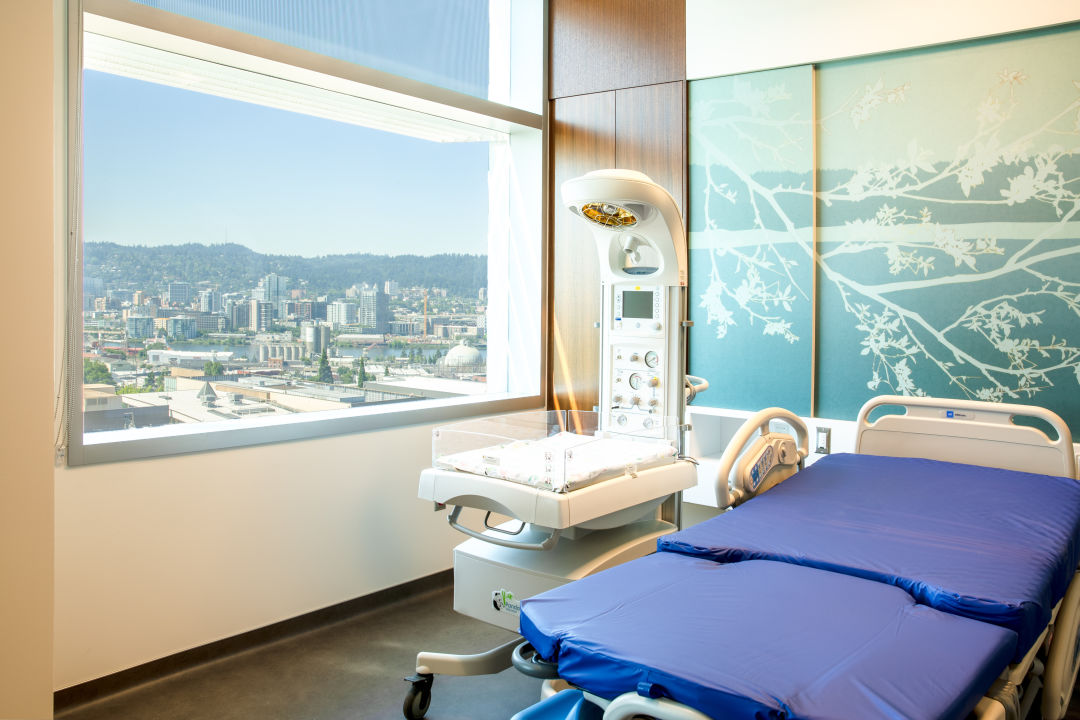Who Will Be the First Baby Born at Randall Children’s Hospital’s New Family Birth Center?

A delivery room at Randall Children’s Hospital’s Family Birth Center, opening July 7
Image: Courtesy Legacy Health
The ninth floor of Randall Children’s Hospital has sat empty since the facility, part of the Legacy Emanuel campus, opened in 2012. But it will finally welcome its first patient on Wednesday, July 7, when someone goes into labor. While COVID-19 precautions preclude a big party, a special gift basket and (if the family is willing) a big splash on social media await the first baby born at Randall’s Family Birth Center.
On a tour the day before, there were more Carhartt overalls than scrubs in the hallways as workers put the near-final touches on the space, designed in collaboration with ZGF Architects, with rich blues and warm browns punctuating a mostly white expanse in the 24,000-square-foot unit—the hallway mural and other artwork will come later. The facility will replace the labor and delivery area at Legacy Emanuel next door and will work in tandem with the neonatal intensive care unit, or NICU, a few floors below.

A nurses’ station in the birth center
Image: Courtesy Legacy Health
Even with bare walls, it feels more high-end-hotel lobby than ER set, but Legacy isn’t pushing its looks. Instead, the health system is banking on the appeal of connecting a maternity ward to a full array of pediatric services, all under one roof.
While a lot goes into someone ends up delivering—insurance networks and geography play a big role—Legacy imagines the immediate availability of pediatric specialists will be a draw, even though the vast majority of births don’t require such services. Many of Emanuel’s births that require those services come as high-risk referrals from other places.
“We put this into a place where we have all the pediatric services, all the emergency obstetric services and surgery available at literally a moment’s notice, at the same time in a unit that we hope feels warm, welcoming, comforting,” says Duncan Neilson, an ob-gyn and Legacy Health Group’s clinical vice president for women’s services. “For the majority of people, childbirth is an experience, and a major life event, but not an illness. We don’t want it to look like a place that treats disease and illness, but we are ready to do that, and do that very quickly.”
Still, says Neilson, the facility—with 12 patient rooms, three full surgeries, and an infant stabilization room staffed with three teams (”We can do triplets!” he says)—is also geared to people who will neither need nor want a lot of the available services. In Portland, the rate of home births and people seeking out low-intervention deliveries is higher than the national average. “We have water birth, we have nitrous oxide, midwifery services, so we can address the entire spectrum of care,” he says. Rooms have floor drains and high-flow taps for portable waterbirth tubs, and Neilson says the Birth Center is working on a doula program with an eye to connecting patients with providers who are a cultural and linguistic match.
Providence is the metro area’s biggest baby deliverer, with about 3,500 babies born in 2020 at St. Vincent and about 2,500 across town at Providence Portland. Kaiser Sunnyside and Oregon Health & Science University swap third and fourth place year to year, with each delivering about 2,200 babies annually. Legacy Emanuel maintained its steady fifth place in Portland with 1,660 births in 2020.




